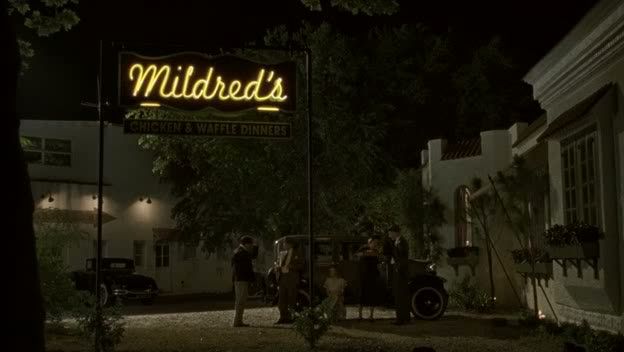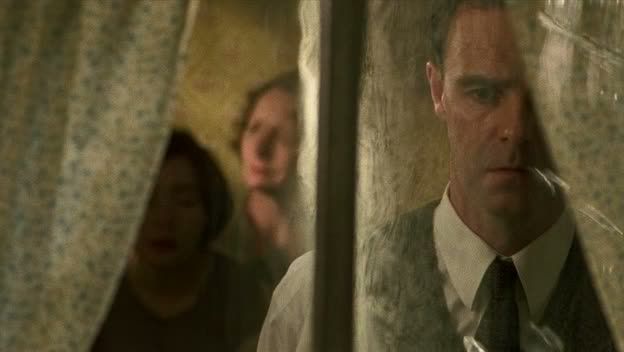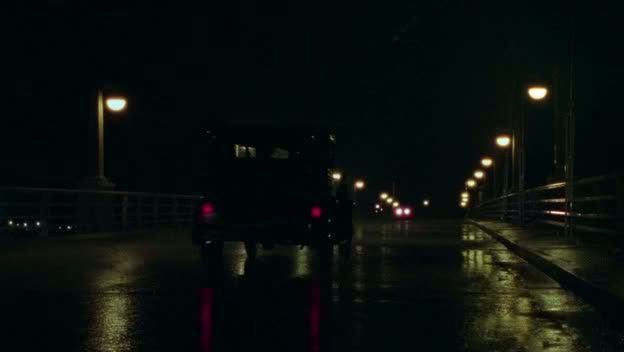

episodes 1-2 | episode 3 | episodes 4-5
The third episode of Todd Haynes' new Mildred Pierce miniseries opens in the immediate wake of the second episode's tragic conclusion. The younger daughter of Mildred (Kate Winslet) died at the end of the second episode, which concluded with a discrete pan away from Mildred embracing her surviving daughter Veda (Morgan Turner), and the third part of the series doesn't gloss over this grief but draws it out, lingering lovingly and sadly over the details. In the opening shot, Haynes' camera pans across Veda's sunlit room, the morning after the last episode's conclusion, and the sunny cinematography, the bright child's toys and decorations, are enough to suggest that maybe it was all a bad dream, until the moment when Mildred's gaze lands on the empty bed of her other daughter, at the same moment as Haynes guides the audience's gaze to the same spot.
In the subsequent scenes, Mildred balances her grief against the practicality and determination that constitute her essential nature; even when she's at her darkest moment, sobbing and despairing, she has the presence of mind to think of the need for a black dress. Haynes frames this moment in one of the through-a-window shots that characterize his style in Mildred Pierce, with Mildred's husband Bert (Brian O'Byrne) in the foreground and Mildred in the background with her friend Lucy (Melissa Leo), discussing her dress size and whether she should wear a veil or not. Soon, Mildred must lay out the clothes her daughter will wear to be buried, and she carefully lays out the clothes on the bed, smoothing out the wrinkles in a dress and placing a pair of socks down one by one. After the funeral, Haynes mirrors this sequence with a shot of Mildred similarly laying out her funereal black dress, straightening it out and hanging it up in the closet, putting it away as though she could put away her grief so neatly. In its quiet, methodical way, this opening is more devastating than a more showy, melodramatic evocation of grief, because it's so horrifyingly normal.
The emotions enter a more melodramatic register later in the episode, but Haynes' emphasis on details remains a constant presence. As in the first two parts of the series, Haynes keeps calling wry attention to the economics of the time, as even after Mildred gets her restaurant up and running, she still has to keep careful track of her money, counting every dollar. More than the first episodes of the series, Depression-era politics linger in the background here, with political speeches playing on radios and the end of Prohibition triggering changes for Mildred's business. The economics of the time are also at the forefront, as Haynes again takes every opportunity to demonstrate how much things cost at this time, taking particular ironic pleasure in a stop to a gas station where a full tank of gas costs a little over a dollar.


The bulk of this pivotal episode, however, focuses on the relationship between Mildred and the fading society heir Monty Beragon (Guy Pearce), who has retained his status and the significance of his family name even while losing all of his money. As he result, he takes money from Mildred even while looking down on her, mocking her status as a lowly working woman. In that, he has a co-conspirator in Veda, who has her own pretensions of upper-class privilege, and who naturally rejoices at Monty's presence in her mother's life. The scenes between Monty and Mildred dominate this episode, as their initially passionate and intense relationship is corrupted by Monty's disdain for work, and his contempt for Mildred's working class lifestyle. In several scenes, the couple argues, trading cutting words as Mildred begins to realize that Monty is not the man she thought he was, until Monty defuses the situation by seducing Mildred.
Despite it all, Mildred still desires him, and Monty knows that at this point, sex is the one thing he still has to offer — though he jokes that he's a gigolo, it often seems to be more or less true. These scenes are painful to watch, to see this strong woman, who's worked so hard and dealt with so much, brought down by this guy who's outwardly smooth and suave but actually quite pathetic. The thing is, Mildred, unlike so many other movie incarnations of the "strong woman," doesn't turn off or suppress her sexuality in the name of her career or her family — she might be making the wrong choice with Monty, but she's making it because she remains a sexual woman throughout all of her troubles. Probably the most telling moment in that respect is the scene when Monty shows up at Mildred's restaurant, preceded by buzz and excitement over his presence, with Mildred's two other men, Bert and her business manager/lover Wally (James LeGros), wondering how such a high society legend heard about the restaurant. When Monty then casually enters the kitchen and addresses Mildred intimately and familiarly, bringing her flowers, Mildred turns and suppresses a wicked smile in a napkin. Rather than being embarrassed or awkward, she's thrilled, proud, showing off Monty like a conquest, taking pleasure in introducing him to Bert and Wally. There's a social-climbing aspect to this pleasure, sure, the thrill of having this access to high society that the others clearly envy, but it's also the thrill of showing off her sexual prowess.
Haynes ends the episode with Mildred finally rejecting Monty's advances, driving to see him and then back home again in a lovingly photographed thunderstorm that externalizes Mildred's anger and confusion. On the way there, toward Monty's spacious but disused mansion, where most of the rooms are closed up, the furniture covered in white sheets, the stormy night seems to glow with eerie headlights illuminating accident scenes and slick roads. On the way back, after Monty flippantly jokes about raping Mildred — she momentarily gives in only to push him off and run away — the night has become even more threatening, even more sinister. The night seems to close in on Mildred, dark and intense, the roads narrow and surrounded on all sides by dark tangles of trees and foliage that seem to press in on her. That's an appropriate place to end this transitional episode that bridges the gap between the opening two hours and the next (and final) two episodes, which promise to leap forward several years into the future. Haynes' Mildred Pierce continues, in its precise and evocative way, to ably balance the naturalism of Haynes' period details against the creeping melodrama that's starting to emerge from the character interactions.
You're really into the thick of it now, Ed. The scene where Mildred lays out the clothes for the funreal recalls the opening where she's making a pie. Indeed thorughout there's an emphasis on physical labor and "women's work" that's rarely shwon in anything I can think of offhand.
ReplyDeleteThat Mildred gets sexual palsure from Monte is dealt with matter-of-factly. Todd says there's this great myth that no one had sex until the 60's. Cain's wiritng shows otherwise, and Todd's true to Cains' refusal critize Mildred for having a sexual life. She has sex -- but the love she desires (Veda) eludes her.
James LeGros -- who's quite the babe in real life -- put on the pounds to play Wally. He's taken them off since. (Echoes of DeNiro in Raging Bull)
"As in the first two parts of the series, Haynes keeps calling wry attention to the economics of the time, as even after Mildred gets her restaurant up and running, she still has to keep careful track of her money, counting every dollar. More than the first episodes of the series, Depression-era politics linger in the background here, with political speeches playing on radios and the end of Prohibition triggering changes for Mildred's business. The economics of the time are also at the forefront, as Haynes again takes every opportunity to demonstrate how much things cost at this time, taking particular ironic pleasure in a stop to a gas station where a full tank of gas costs a little over a dollar."
ReplyDeleteWell, Ed, this was the social issue that was broached in Part I, and the one I centered my previous comment on. Haynes is a fanatic on detail, and it's at least one reason why I have embraced his FAR FROM HEAVEN as the greatest film of the new millenium. As you know in that masterpiece he was obsessive about clothes, cars, furniture and architecture. Setting any work within the proper physical environment enhances the social issues and melodramatics being played out within. Again, I haven't watched this MILDRED PIERCE yet, but based on your (and David's recommendation) I have so much to savor and look forward to. Yes, when Veda's younger sister dies, it was unspeakably poignant.
Hayes and MILDRED PIERCE seem like natural fits, much like Sirk with WRITTEN ON THE WIND. I guess that Curtiz did this is 1945 is now only a footnote. Or perhaps I'm getting too carried away with expectations.
Fabulous review. You've dug deeper than anyone on-line or elsewhere for that matter.
David, good connection between the funeral clothes and the pie. The emphasis on "women's work" is a big part of the series' essence and themes. The upper class characters like Monte, and the wannabes like Veda, have nothing but contempt for work, but Mildred, after feeling similar ambivalence and prideful resistance about becoming a waitress in the first two episodes, has now embraced the work ethic as noble. Even if she still occasionally backslides like when, unable to take the mockery of Monte and Veda any longer, she yells at her kitchen staff for being loudly celebratory during Christmas. That's a pretty heartbreaking moment, because you can see her frustration and her immediate recognition that this isn't who she wants to be.
ReplyDeleteSam, you'll definitely enjoy this one. It's different from Far From Heaven in many ways, but of course it does carry over and expand that film's interest in period detail as a conduit of social commentary.
It IS a heartbreaking moment because Mildred's strung between two worlds -- the middle-class from whence she came and the upper-crust that Veda demands. That she returns to the middle-class shows that Cain and Todd firmly believe that "upward mobility" in American life is a destructive fantasy.
ReplyDeleteYeah, Veda is an icon of everything that's wrong with the idea of "upward mobility" - contemptuous of her surroundings, vainly attempting to become someone different, looking down on her mother who gives her everything.
ReplyDeleteSpeaking of Veda, I forgot to mention the scene towards the end of the episode when she and her mother trade slaps, and young Veda is caked in heavy and garish makeup, a premonition of her older self, who's soon to arrive for the final 2 hours of the series. Veda not only wants to be richer, she wants to be older.
Lovely review, both of them, Ed.
ReplyDeleteYes, Veda is compared with Mildred throughout. One could say she's her doppelganger even. Isn't really a surprise how Veda comes to know everything about Mildred every time.
And as you mention, there's a to and fro movement happening throughout the film on multiple levels. Mildred oscillating between multiple socioeconomic classes, Haynes oscillating between empathy and satire, tone swinging between naturalism and melodrama etc.
I've liked the series so far, although I wasn't exactly blown away. Just better than a well mounted period piece so far, although I suspect Haynes will open up the film to map it to the recent recession (He's probably gonna use Veda as Mildred-Part-2 to comment on the eternal desire for social mobility and the Great American Dream. Hope that's not all).
Great work again, Ed. How ever do you manage to be so prolific and incisive at the same time?!
Cheers!
Thanks a lot, JAFB, I appreciate the kind words. I wouldn't exactly say I've been blown away by the series so far, but nor would I call it only slightly better than an average period piece. It's been really good, really rich and fascinating. Haynes has already started hinting at the current recession as a reference point - I thought the gas price bit was an especially pointed joke about current gas prices. The emphasis on economics here makes comparisons to the present-day economy unavoidable.
ReplyDeletei thought the direction of this third episode was very good (much better then the first two) but i still would have liked to see some more in depth development, particularly in the disintegration of the Monty relationship. it was too rushed to have the intended emotional effect on me.
ReplyDeleteit was really weird that they sprung Moyra on us at the funeral without any explanation. a very distracting moment in what should have been a very emotional scene.
i'm still pretty disappointed overall with the series sticking to such tried and true themes instead of delving into some of the more interesting ones touched on in the book.
a more interesting direction is Mildred sowing the seeds of her own destruction. her great flaw is that instead of placating the men in her life she treats them like the pathetic creatures they are. she badgers her husband away because he was too cuddly and ineffectual as a businessman (you get the sense in the book that the only decisive thing Bert ever did was to knock up an underage girl). she shames Monty into hating her because she resents his privilege. she spoils Veda rotten (literally) because she projects all that everyone (Mildred included) in her life lacks onto her. when her daughter dies her biggest thought is "thank god it wasn't Veda".
it just seems to me that there are more interesting places to take this then the 1945 film and now the miniseries have.
Good comment, Leroysghost. I really need to read the novel now, because I've now liked both adaptations of it to varying degrees, and it sounds fascinating. Not surprising, of course, that the novel would dig more in depth into various aspects of this story and these characters. As I've suggested in my reviews so far, I think the emphasis of Haynes' version, and the reason he wanted to work with this story, is the economic theme, the class tug-of-war and the commentary on social mobility. Haynes seems more interested in that stuff, at least so far, than the psychological/melodramatic implications of the material, though I suspect that emphasis may shift to some degree in the final two hours, with the introduction of adult Veda. I'm looking forward to seeing how he pulls it all together for the finale.
ReplyDelete